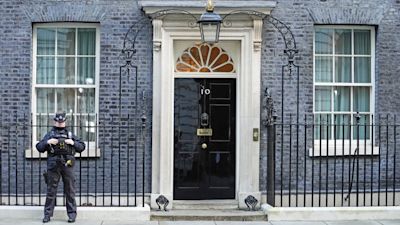Former MI6 chief: Next PM will be hit by the 'gravity' of the role

The first duty of a government is to defend the country, Sir Alex Younger, the former MI6 chief, told ITV News Global Security Editor Rohit Kachroo
It is the moment when any incoming prime minister is forced to think of the magnitude of their new role.
Following long weeks of campaigning - of baby-holding and handshakes - the writing of ‘the letters of last resort’ is when it becomes clear that running the country is about more than mere politics.
If Labour wins the General Election, one of Sir Keir Starmer’s early tasks will be to handwrite a letter to Britain’s nuclear submarine commanders instructing them how to respond to an attack which has potentially killed him and wiped out the UK.
"I know that’s been the case for his predecessors, where suddenly the gravity of what he has volunteered for, when you think about the enormity," says Sir Alex Younger, the former MI6 chief.
"The first duty of a government is to defend the country, so as is famous, he’ll be confronted with the need to think about the instructions that he gives to our Royal Navy submarines carrying the deterrent.
"And I suspect he’s been very busy thinking about stuff.
"If it is Keir Starmer, that will be a moment. He’ll be given advice on what to put in that letter, but it is his responsibility and his alone."
But for Sir Alex, who saw the greatest global security threats to the UK "from the inside" during six years running the Secret Intelligence Service, this will be the start of a decade of international challenges facing whoever wins the election.
They would face unpredictable conflicts in Ukraine, the Middle East, and potentially the Far East.
But, in Sir Alex’s view, Britain’s voice will be reduced because it has made itself "irrelevant" thanks to Brexit.
Subscribe free to our Election Briefing newsletter here for exclusive and original campaign coverage from ITV News. Direct to your inbox at 5pm every weekday
"Since I've left office and I've travelled around Europe, I am profoundly depressed. Nobody mentions the UK.
"We've just made ourselves irrelevant. And this is extraordinary," he says.
"At the beginning part of this century, we were the dominant force. France has effectively eclipsed that and, and we just, you just don't hear a discussion of us. And I think Brexit has marginalised us."
Sir Alex says he is "worried" about Donald Trump returning to office in the US elections in November.
"What's the thing that we do that autocratic regimes don't do? We make alliances and we have a separation of powers within our countries that make our governments accountable. I think on both those issues, Donald Trump takes a different approach."
Although he commends the former president’s efforts in forcing European allies to increase their defence spending after years of "free-riding", he says whoever becomes prime minister should seek to persuade Trump of the value of its Western security alliances.
"My message to Donald Trump, if I was the next prime minister, would be that America is not being done over. It's a prime beneficiary of the international system that it's set up and its willingness to police globalisation. Whilst I can see that is onerous and expensive, it's profoundly beneficial."
But, he predicts, whoever wins the General Election on Thursday will have a decade to face down the Russian threat.
"If we don't do it in 10 years, I think we're going to put our kids in a position of extraordinary vulnerability for which they will not thank us."
And responding to claims by Nigel Farage that the EU and NATO provoked Russia’s invasion of Ukraine, he said he agreed to part of the Reform UK leader’s argument but rejected the substance.
"It may surprise you, but I half agree with him. We absolutely did provoke Russia. But the catch is that we provoked Russia not through our strength, but through our weakness. It was our serial weakness that led us to where we are today."
"That's where the rubber hits the road. We are all human beings, we have basic needs, for food and love and all of these things. But perhaps the most fundamental is protection.
"And for good or ill, and however realistic this is or not, we reside those hopes in our government. And if, if the government seemed to falter in that space, the effects on our confidence and national mood are almost instant."
Want a quick and expert briefing on the biggest news stories? Listen to our latest podcast episode to find out What You Need To Know...